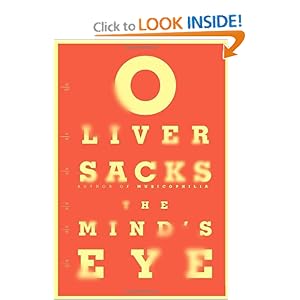

 字體:小 中 大
字體:小 中 大 |
|
|
||
| 2010/11/10 03:15:28瀏覽1414|回應0|推薦9 | ||
 Musicophilia: Tales of Music and the Brain, Revised and Expanded Edition [Paperback]Oliver Sacks (Author)Musicophilia: Tales of Music and the Brain (2007) – Revised & Expanded (2008) In his newest book — now revised and expanded for the paperback edition — Dr. Sacks investigates the power of music to move us, to heal and to haunt us. Musicophilia, a New York Times bestseller, has been named one of the Best Books of 2007 by the Washington Post and the editors ofAmazon.com 147 of 157 people found the following review helpful:
Music and Science were never so interesting,
This review is from: Musicophilia: Tales of Music and the Brain (Hardcover)
Dr. Oliver Sacks is a British neurologist with a love of music and science. This book blends music and science together like no book I've ever read. There are some amazing stories here. I love the story of surgeon Tony Cicoria who developed a passion for listening and playing music after he was struck by lightning. The story of British conductor Clive Wearing is amazing too. He developed amnesia after his brain became inflammed. He has the the memory and ability to conduct and sing music, but he can't remember anything else. I also loved the story the research chemist named Salimah. Her shy personality was changed after she suffered a seizure. She suddenly had the desire to listen to music all the time. I also touched by the story of Woody Geist. He suffers from Alzheimers disease, but he still performs in an a cappella singing group. Leon Fleisher is a classical piano player who performed with one hand for many years because of a condition called dystonia which affected his right hand. I learned about a genetic disorder called Williams Syndrome in this book. Kids with Williams Syndrome have difficulty paying attention, but they often possess a love for music. I was entertained and informed by this book so much.The Mind's Eye: New book by Dr. Oliver Sacks The Mind’s Eye Description: Sacks explores some of the most fundamental facets of human experience–how we see in three dimensions, how we represent the world internally when our eyes are closed, and the remarkable, unpredictable ways that our brains find new ways of perceiving that create worlds as complete and rich as the no-longer-visible world. Editorial ReviewsFrom BooklistSacks, famous for combining his knowledge as a physician and his compassion for human stories of coping with neurological disorders, offers case histories of six individuals adjusting to major changes in their vision. A renowned pianist has lost the ability to read music scores and must cope with the fear of an ever-shrinking life as her vision worsens. A prolific writer develops “word blindness” and is unable to read even what he himself writes, forcing him to develop memory books in his mind, adaptations that he later incorporates into his fiction writing. Sacks recalls his own struggle to cope with a tumor in his eye that left him unable to perceive depth. He includes diary entries and drawings of his harrowing experience. Sacks, author of the acclaimed Musicophilia (2007), among other titles, combines neurobiology, psychology, and psychiatry in this riveting exploration of how we use our vision to perceive and understand the world and our place in it and how our brains teach us to “see” those things we need to lead a complete, fulfilled life. --Vanessa Bush
Oliver Sacks, eminent neurologist and 'Awakenings' author, dies at 82Published August 30, 2015 Oliver Sacks, the eminent neurologist and acclaimed best-selling author, died Sunday at his home in New York City. He was 82. The cause was cancer, The New York Times reported, citing the doctor’s longtime personal assistant. Sacks revealed he had terminal cancer in February in an Op-Ed piece he wrote for the paper. He told readers his luck had run out, a rare tumor of the eye, an ocular melanoma, had spread to his liver. His remarkable career included a number of hugely popular books, including “Awakenings” which became an Academy Award-nominated movie starring Robin Williams and Robert De Niro and “The Man Who Mistook His Wife for a Hat,” an exploration of unusual afflictions of the brain. "When people die, they cannot be replaced," Sacks wrote in his Times essay. “They leave holes that cannot be filled, for it is the fate — the genetic and neural fate — of every human being to be a unique individual, to find his own path, to live his own life, to die his own death.”
|
||
| ( 知識學習|其他 ) |














